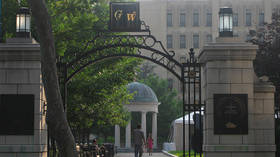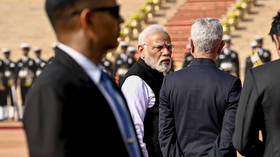The doctors will cancel you now. US cardiologist gets demoted for daring to criticise affirmative action in med school admissions

An Asian-American cardiologist was targeted by a Twitter mob because he wrote an article criticising the use of affirmative action in medical school admissions. Naturally, his university threw him under the bus.
It all began on 2 August when some Twitter activists raised the alarm about a paper published in the Journal of the American Heart Association (JAHA). The paper, written by cardiologist Norman Wang, was published on 24 March, but had apparently gone unnoticed by the activists up until this point. One of the instigators, who is described in her Twitter bio as a “Director of Diversity & Inclusion,” wrote, “Rise up, colleagues! The fact that this is published in ‘our’ journal should both enrage & activate all of us.”
Numerous other condemnatory tweets followed in the subsequent hours and days. One tweet disclosed that Wang had previously “tried to mansplain” gender pay gaps to the individual in question, thereby casting a further negative light upon the beleaguered doctor. Soon, a former president of the American Heart Association (AHA) got involved. In response to the many frantic queries concerning how Wang’s paper could have possibly been published in JAHA, he insisted that all the AHA’s journals are “edited independent of the organization,” and promised there would be a review.
The next day, the Editor-in-Chief of JAHA issued an editorial statement on Wang’s article, which claimed that “its central purpose was to argue against affirmative action.” He proclaimed that the opinions expressed by Wang “do not reflect in any way” his own views or those of the editorial board, and assured readers that he and the other editors “condemn discrimination and racism in all forms.” He also noted, “Much more needs to be done to increase diversity, equity and inclusiveness in medicine and cardiology.”
The day after that, the AHA itself said in a tweet that Wang’s paper “does NOT represent AHA values.” In a tone so obsequious it could only represent a communication from a large organisation in the middle of a social media scandal, the tweet then said, “JAHA is editorially independent but that’s no excuse. We’ll investigate. We’ll do better.”
On 5 August, the AHA issued a longer statement on Wang’s paper, where its attempts at expiation continued. According to the statement, the AHA “denounces the views expressed in the article and regrets its role in enabling those views to be promoted.” Referring to the journal in which the article had been published, the statement reaffirmed that “it can and will do better.” The statement also made sure to point out that the AHA “believes much more – not less – needs to be done to increase diversity, equity and inclusion in science, medicine and cardiology.”
In a tweet linking to the AHA’s statement, the current president of that esteemed organisation described Wang’s views as “retrograde and factually incorrect.” He also stated, in case you hadn’t gotten the message, that the AHA “believes diversity, equity, and inclusiveness are essential to the future of medicine and cardiology.”
On 6 August – just four days after the scandal had first erupted on Twitter – Wang’s paper was retracted. According to a brief notice posted on the journal’s website, “the article contains many misconceptions and misquotes and that together those inaccuracies, misstatements, and selective misreading of source materials strip the paper of its scientific validity.” Readers were also informed that “JAHA will be publishing a detailed rebuttal.” (Said rebuttal has yet to appear online.)
The day after that, yet another statement condemning Wang’s paper was published, this time by the American Association of Medical Colleges. It stated, “We applaud the recent statement by the American Heart Association (AHA) denouncing the views expressed in the article by Norman C. Wang.” If you’re surprised that a supposedly respectable organisation would issue a statement applauding another organisation’s denunciation of an individual’s views, you’re not alone. Perhaps the next statement will applaud the statement applauding the statement denouncing Wang’s views.
It was obviously not a good few days for Wang himself. In addition to being targeted by a Twitter mob, being denounced by colleagues and professional organisations, and seeing his article in JAHA get retracted, he ended up being removed as director of the Electrophysiology Fellowship Program at the University of Pittsburgh Medical Center. On 3 August, a senior academic at the Center stated that Wang was removed “as soon as this article came to our attention,” suggesting there was very little deliberation beforehand.
So what exactly did Wang say in his article to engender all this outrage? Did he call for racial segregation in US medical schools, or for members of certain races to be denied entry altogether? (Being an American of Asian descent, Wang is an unlikely white supremacist.) No, he merely argued that “all who aspire to a profession in medicine and cardiology must be assessed as individuals on the basis of their personal merits, not their racial and ethnic identities.”
Wang did not even go so far as to call for the immediate end of racial preferences in medical school admissions. Rather, he drew on the Supreme Court’s decision in Grutter v. Bollinger to argue that such preferences “should be gradually rolled back with a target end year of 2028.” Wang supported his arguments with ample data showing that whites and Asians are less likely to be admitted to US medical schools than blacks and Hispanics with the same scores on the Medical College Admission Test (MCAT).
Note that these data are consistent with figures previously reported by the American economist Mark Perry. He noted that, among students who have the average grade point average and the average MCAT score of all those applying to medical school, blacks have an acceptance rate of 81 percent, whereas Asians have an acceptance rate of only 21 percent.
Wang also disputed the claim that making the medical workforce more ‘diverse’ would necessarily lead to better healthcare, a line of argument at which his critics took particular umbrage. However, even if you disagree with Wang’s views (and affirmative action is surely something reasonable people can disagree about), the chorus of denunciation and swift professional sanctions to which he was subjected seem entirely unjustified.
In his initial statement on Wang’s article, the journal’s Editor-in-Chief said, “JAHA will support all efforts to correct this error, including but not limited to the publication of alternate viewpoints.” Would it not have been sufficient to simply publish some of these “alternate viewpoints” as commentaries on the article? That way, we could have been spared the ‘woke’ theatrics – the grovelling apologies, the ritual denunciations, the inane promises to “do better” – and an instructive debate between Wang and his critics might have ensued.
The Wang affair is just the latest skirmish in an ongoing culture war within the academy. (Back in June, a very similar scandal played out at the German Chemistry journal Angewandte Chemie.) The nature of this culture war is such that whenever someone takes the ‘incorrect’ position on one of several hot-button issues, he leaves himself open not merely to criticism, but to scurrilous personal attacks and career-wrecking sanctions. If important issues like affirmative action can no longer be debated in academic journals, it is unclear what exactly such journals are for.
Think your friends would be interested? Share this story!
The statements, views and opinions expressed in this column are solely those of the author and do not necessarily represent those of RT.
















